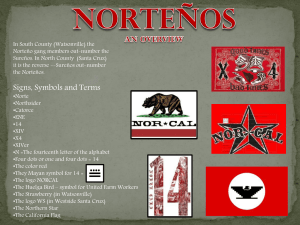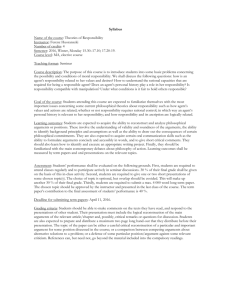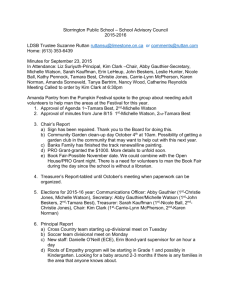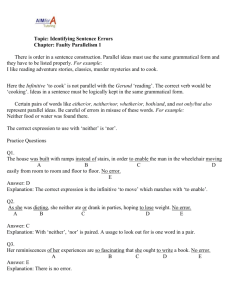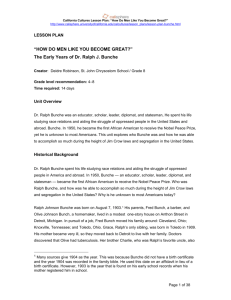Generic Syllabus ECON 106G Game Theory
advertisement
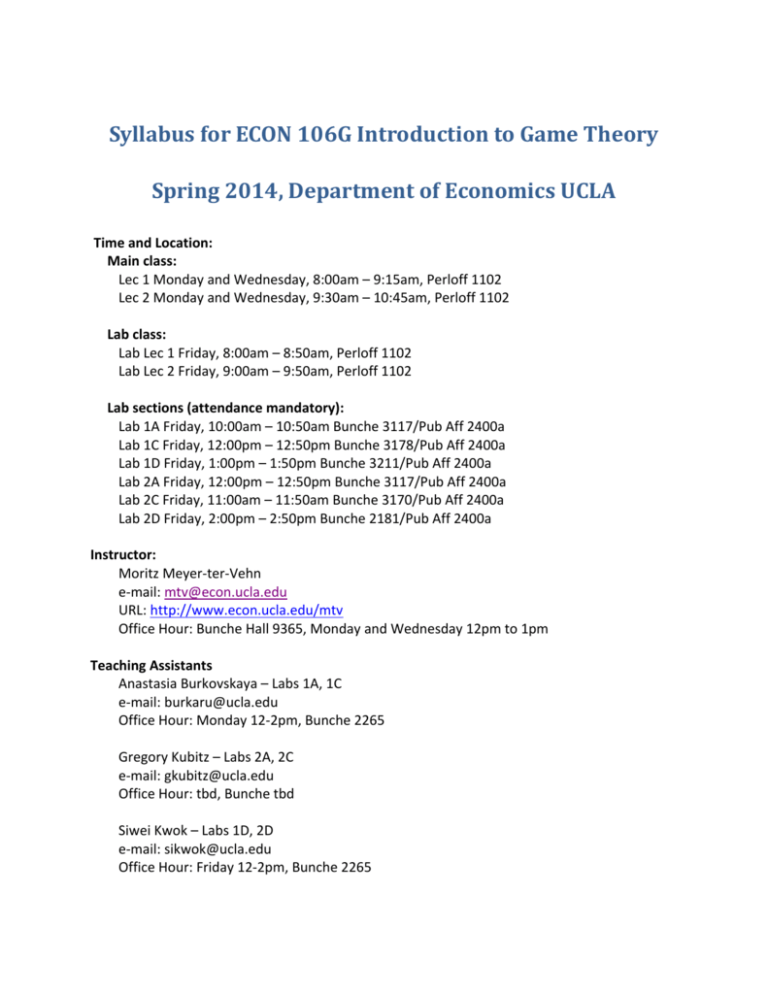
SyllabusforECON106GIntroductiontoGameTheory Spring2014,DepartmentofEconomicsUCLA Time and Location: Main class: Lec 1 Monday and Wednesday, 8:00am – 9:15am, Perloff 1102 Lec 2 Monday and Wednesday, 9:30am – 10:45am, Perloff 1102 Lab class: Lab Lec 1 Friday, 8:00am – 8:50am, Perloff 1102 Lab Lec 2 Friday, 9:00am – 9:50am, Perloff 1102 Lab sections (attendance mandatory): Lab 1A Friday, 10:00am – 10:50am Bunche 3117/Pub Aff 2400a Lab 1C Friday, 12:00pm – 12:50pm Bunche 3178/Pub Aff 2400a Lab 1D Friday, 1:00pm – 1:50pm Bunche 3211/Pub Aff 2400a Lab 2A Friday, 12:00pm – 12:50pm Bunche 3117/Pub Aff 2400a Lab 2C Friday, 11:00am – 11:50am Bunche 3170/Pub Aff 2400a Lab 2D Friday, 2:00pm – 2:50pm Bunche 2181/Pub Aff 2400a Instructor: Moritz Meyer‐ter‐Vehn e‐mail: mtv@econ.ucla.edu URL: http://www.econ.ucla.edu/mtv Office Hour: Bunche Hall 9365, Monday and Wednesday 12pm to 1pm Teaching Assistants Anastasia Burkovskaya – Labs 1A, 1C e‐mail: burkaru@ucla.edu Office Hour: Monday 12‐2pm, Bunche 2265 Gregory Kubitz – Labs 2A, 2C e‐mail: gkubitz@ucla.edu Office Hour: tbd, Bunche tbd Siwei Kwok – Labs 1D, 2D e‐mail: sikwok@ucla.edu Office Hour: Friday 12‐2pm, Bunche 2265 Overview: Game Theory provides a set of tools to study the interaction of multiple strategic agents. It can be used to analyze situations in which the payoff of one agent, say firm A’s profit, depends not only on its own actions, say the quantity it produces, but also on the actions of other agents, say the quantity of A’s competitor. These situations are pervasive in business and economics. In such situations game theory can guide us to improve our actions and help us to understand observed behavior. This course introduces the basic concepts of game theory: dominant strategies, rationalizability, Nash equilibrium, mixed strategies, backward induction, commitment, sub‐game perfect equilibrium, cooperation through repeated interaction, incomplete information and Bayesian‐Nash equilibrium. The concepts will be illustrated by numerous highly stylized business applications, including quantity competition, price competition, product differentiation, entry into an industry, exit from and industry, bargaining, and bidding in an auction. The best way to learn game theory is by applying it to examples and we will do so extensively in class, homework assignments, and practice problems over the course of the quarter. The Lab: The lab class and the lab sections complement the theory learnt in class with lab experiments and a project. The lab experiments are designed to test the theoretical predictions of game theory and highlight its limitations. Students act as participants in these games, followed by a group discussion about the strategies employed in the experiments and how these strategies conform with, and differ from, game‐theoretic predictions. Some of the experimental labs will be followed up by a lab‐lecture on Friday morning. For the project, groups of 3‐5 students from the same lab section will choose and perform a mini‐research project. Topics could be inspired by those covered in class or other areas of students’ interest and should be analyzed with the tools learnt in class or lab. Methodologically, projects could be either theoretical or experimental. A theoretical project applies or extends a model from class to a specific scenario from current events in the world of business or politics. An experimental project develops a game‐theoretic experiment to test the predictions of some game theory model. Students will present the results of their projects to UCLA alumni at the Economics in Action conference on May 30th, Friday of week nine. The class, 106G, and the lab, 106GL, are one package; so if you want to enroll in one you must also enroll in the other. Prerequisite: We will use some calculus and basic probability theory. Intermediate Microeconomics, ECON 101, is a prerequisite for this course. Exams: Midterm: Monday, May 5th, in class Final: Friday, June 13th, 8:00am – 11:00am Grading: The grading for the class, 106G, and the lab, 106GL, is separate. The final grade in the main class will be based on the two exams and four problem sets with weights 50/30/20 for the final/midterm/problem‐sets. I encourage you to work together on the problem sets; you can submit your solutions in groups of up to five students. Problem sets are due on Monday morning before class. The grading of the lab is based on the final project, as well as attendance and participation in the lab sections. Project abstracts are due on May 16th, Friday of week seven. Textbook: Joel Watson: “Strategy: An Introduction to Game Theory” ‐ this book is available at the UCLA Book Store and two presence copies are available at the College Library Readings for the Lab: Adam Brandenburger and Barry Nalebuff: “Co‐Opetition” Adam Brandenburger and Barry Nalebuff: “The Right Game: Use Game Theory to Shape Strategy” Lecture Plan Week 1: Lecture 1: Introduction to Game Theory (Watson 1‐2) Lecture 2: Dominant strategies and best responses (Watson 3‐6) Lab Lecture: Kick‐off for projects Lab Section: Experiments – Static 2 by 2 Games Week 2: Lecture 3: Rationalizability (Watson 7‐8) Lecture 4: Weak dominance (Watson 6) Lab Lecture: Noisy rationalizability Lab Section: Experiments – Bargaining and Ultimatum Week 3: Lecture 5: Nash equilibrium (Watson 9) Lecture 6: Quantity and price competition (Watson 10) Lab Lecture: Ultimatum game experiments Lab Section: Experiments – Markets Week 4: Lecture 7: Mixed strategy equilibrium (Watson 11) Lecture 8: Mixed strategy applications (Watson 11) Lab Lecture: Cooperative Game Theory / Business Strategy Lab Section: Project Preparation – Group formation Week 5: Lecture 9: Extensive form games and backward induction (Watson 14) Lecture 10: Commitment (Watson 15) Lab Lecture: Business Tactics Lab Section: Project preparation Week 6: Monday: Midterm in Class Wednesday: Bargaining (Watson 18‐19) Lab Lecture: Company Presentations Lab Section: Project preparation; Groups due Week 7: Lecture 12: Subgame perfect equilibrium (Watson 15) Lecture 13: Repeated games (Watson 22) Lab Lecture: Gameboard simulation Lab Section: Gameboard simulation; Abstracts due Week 8: Lecture 14: Equilibria in infinitely repeated games (Watson 22) Lecture 15: Games with incomplete information (Watson 24, 26) Lab Lecture: Presentation skills – oral/Dry‐run Lab Section: Project preparation Week 9: Monday: Memorial Day Lecture 16: Auctions (Watson 27) Lab Lecture: Kick‐off conference Lab Section: Conference Week 10: Lecture 17: Reputation (not in Watson) Lecture 18: Recap Lab Lecture: Q&A for final Lab Section: Q&A for final

